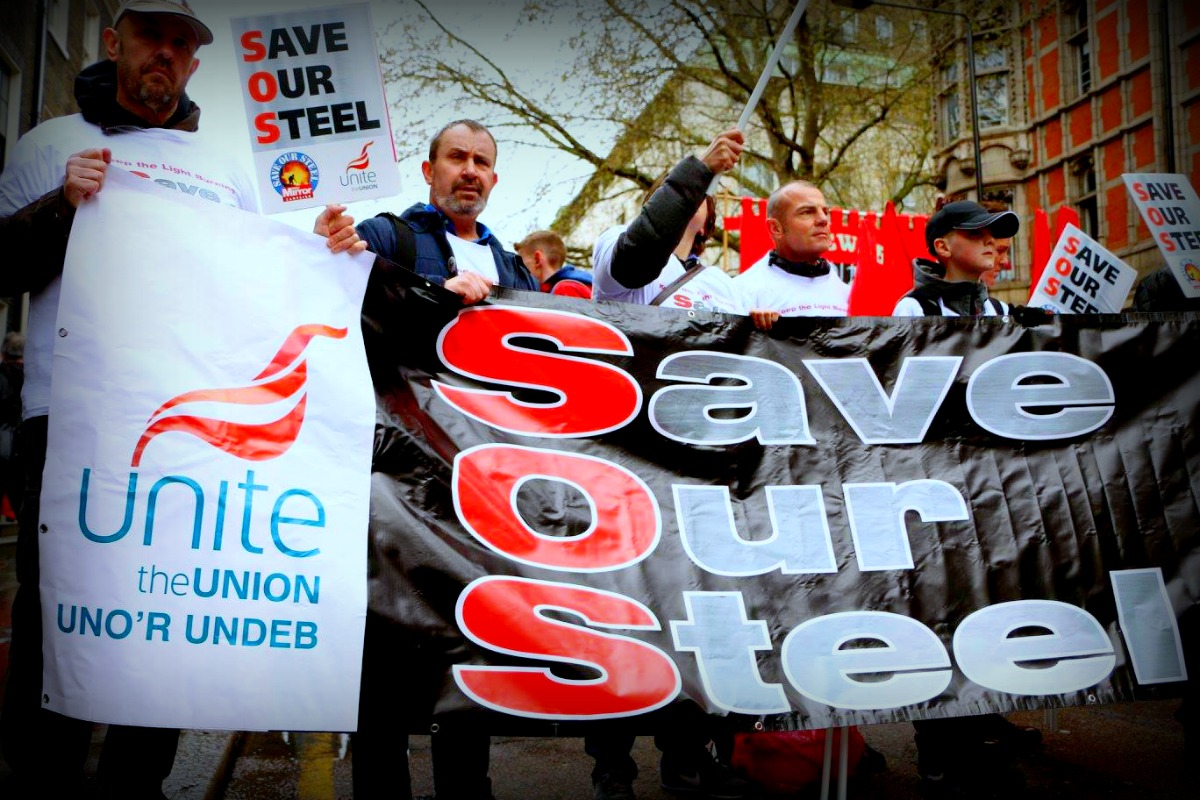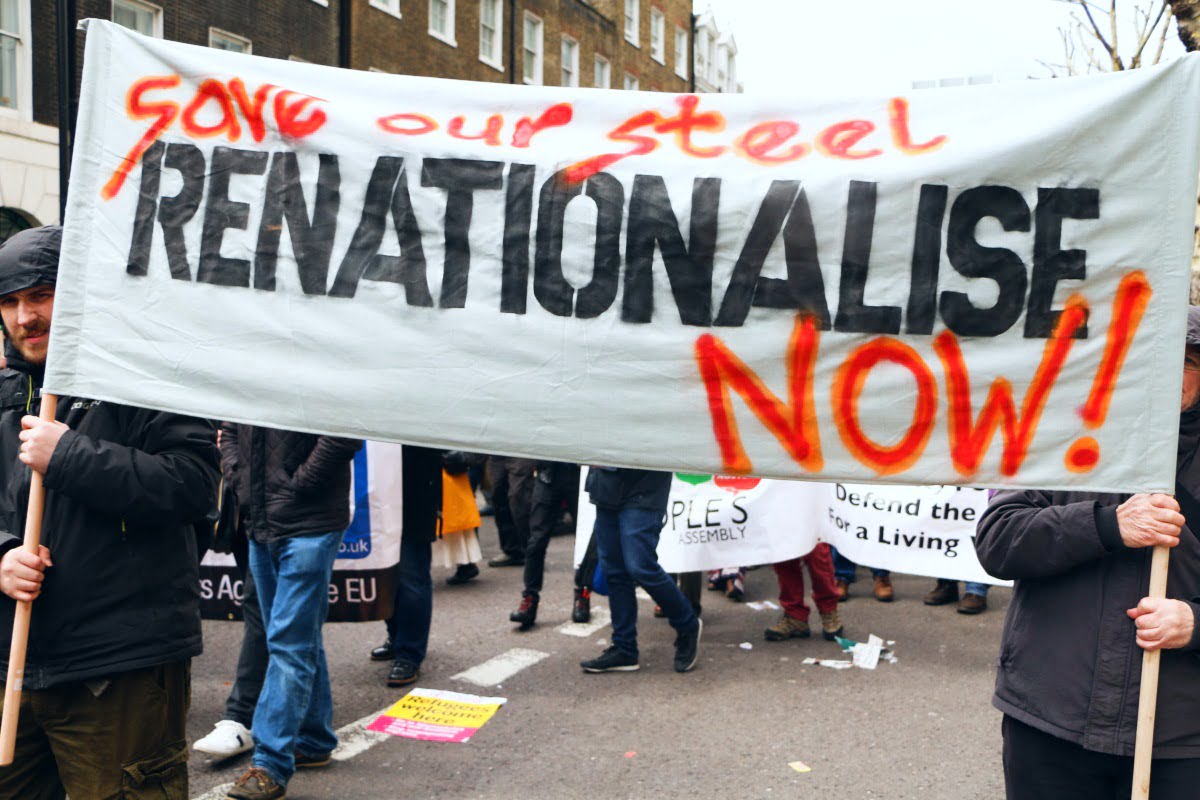Bankrupt British Steel is to be bought up by new Chinese owners. But this latest takeover will solve none of the problems facing the UK steel industry – nor its workers. The labour movement must fight for nationalisation.
After months of uncertainty following its collapse into insolvency last year, British Steel will be taken over by Chinese firm Jingye Group. Although the business will retain its original name (for now), the takeover of British Steel will usher in a new period of instability for the troubled UK steel industry.
New investment amounting to £1.2 billion has been promised. And some steelworkers have even been offered wage increases. But the downside is that between 400-500 workers have now been sacked, including a layer of union officials from Community, Unite and the GMB.
This is an early sign of how the new Chinese bosses intend to run the company – including the 150-year-old plant at Scunthorpe, which directly employed 3,000 people before the latest job losses.
Callous
 Although the sale was reported on all the mainstream news channels, there has been a complete silence in the media about how angry steelworkers were frogmarched off the nine-square mile plant at Scunthorpe by security staff and local police.
Although the sale was reported on all the mainstream news channels, there has been a complete silence in the media about how angry steelworkers were frogmarched off the nine-square mile plant at Scunthorpe by security staff and local police.
Last year, a GMB full-time official confided to me that staffing levels at the plant had already been cut to the bone. In some areas, the numbers employed were dangerously low. But these jobs could have been saved by sharing out the work, with no loss of pay.
It is obvious that by using these callous methods – in particular targeting union representatives – Jingye aims to intimidate the remaining workforce.
The methods they intend to import are copied directly from the bosses in Britain and across the rest of the world: union-busting; speed-ups; and constant pressure to force workers to give every drop of blood – all for the maximum profit at minimum cost.
Decline
The crisis of British Steel is historic, going back many decades. It reflects the shortsightedness and impasse of British capitalism, and the long-term decline and collapse of UK manufacturing and industry.
This has been constant ever since Thatcher – the consummate representative of finance and rentier capital – set about selling off nationalised industries, attacking the organised working class, and creating millions of job losses across a whole swathe of northern towns and cities. As a result, solid skilled jobs were replaced with either low-paid and zero-hour contract work, or a trip to the dole office.
As Tosh McDonald from ASLEF has pointed out, there used to be a ‘northern powerhouse’ economy linking rail, steel and coal – back when these were all nationalised industries. Despite the lack of workers’ control, this nevertheless showed what could be achieved under public ownership.
Freight from the Scunthorpe steelworks paid for the entire railway wage bill in the north-east region, even before a single passenger stepped foot on a train. Since then, the story of steel production in the UK has been one of failure after failure.
Overproduction
 China is now far and away the biggest producer of steel. Between 2013-2014, the country produced over 1500 million tonnes – more steel than Britain had managed to produce in the whole period from 1870 to the present day. In turn, the collapse of the construction industry in China has led to a classic capitalist crisis of overproduction.
China is now far and away the biggest producer of steel. Between 2013-2014, the country produced over 1500 million tonnes – more steel than Britain had managed to produce in the whole period from 1870 to the present day. In turn, the collapse of the construction industry in China has led to a classic capitalist crisis of overproduction.
In reality, there is a generalised crisis of steel production across the world, not just in Britain. In China, 1.3 million jobs in coal and steel have been lost in the last period. This is a finished recipe for social and political explosions in the years ahead. No wonder the Chinese capitalists have been looking for new markets to exploit.
There are lucrative contracts up for grabs in the UK, including the HS2 bonanza. Hence the interest in British Steel, and the recent sale to the Chinese. The question is: who will benefit? Clearly not the workers.
In turn, there is clearly every incentive for British workers to build links of solidarity with their Chinese counterparts, as both workforces now face a common enemy.
Nationalisation
 Far from solving any problems, the sale of British Steel has just created new ones.
Far from solving any problems, the sale of British Steel has just created new ones.
Which capitalist firm actually owns British Steel is not the issue. One boss is as ruthless as another. As with all the private owners of British Steel in the past, the new owners are only interested in what they can grab.
The real issue, therefore, is whether steel production is used for the benefit of the workers and the whole of society, or just as a source of quick profits at our expense.
The demand made by many workers for nationalisation is the only way forward. The labour movement must fight for this on the industrial and political front.
- Nationalise all steel plants – with no compensation to the big business vultures!
- For a socialist plan of production!
- Solidarity with Chinese steelworkers!
- Kick the Tories out!






